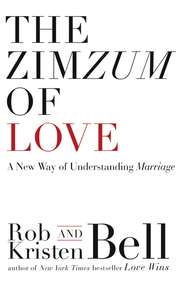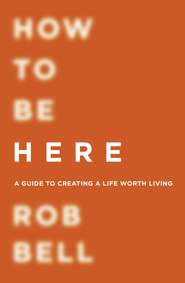По всем вопросам обращайтесь на: info@litportal.ru
(©) 2003-2024.
✖
The Complete Rob Bell: His Seven Bestselling Books, All in One Place
Автор
Год написания книги
2018
Настройки чтения
Размер шрифта
Высота строк
Поля
In this story, God is the God who stands in the driveway, waiting for his kids to come home.
So the party starts and everybody is celebrating, and the older brother comes in from the field mad. He wants to know why his brother gets a party and he doesn’t. The parable ends with the father telling the older son, “You are always with me, and everything I have is yours.” The father wants the older son to know that everything he wants he has always had; there is nothing he could ever do to earn it. The elder son’s problem isn’t that he doesn’t have anything; it’s that he has had it all along but refused to trust that it was really true.20 (#ulink_b05df388-e4d9-5c3c-98f4-b4b50a605b22)
We cannot earn what we have always had. What we can do is trust that what God keeps insisting is true about us is actually true.
Let’s take this further. As one writer puts it, “While we were still sinners, Christ died for us.”21 (#ulink_7b03bc91-d798-5d58-a64e-9ffc0cfb0551) While we were unable to do anything about our condition, while we were helpless, while we were unaware of just how bad the situation was, Jesus died.
And when Jesus died on the cross, he died for everybody.
Everybody.
Everywhere.
Every tribe, every nation, every tongue, every people group.22 (#ulink_fa5271d9-474e-5e4b-82d7-9a0096feef77)
Jesus said that when he was lifted up, he would draw all people to himself.23 (#ulink_37ecb5a0-e36b-579e-9c31-f0bc02625641)
All people. Everywhere.
Everybody’s sins on the cross with Jesus.
So this reality, this forgiveness, this reconciliation, is true for everybody. Paul insisted that when Jesus died on the cross, he was reconciling “all things, in heaven and on earth, to God.”24 (#ulink_22e0b3c6-0072-5e30-98ae-0513b576c038) All things, everywhere.
This reality then isn’t something we make true about ourselves by doing something. It is already true. Our choice is to live in this new reality or cling to a reality of our own making.
God is retelling each of our stories in Jesus. All of the bad parts and the ugly parts and the parts we want to pretend never happened are redeemed. They seemed pointless and they were painful at the time, but God retells our story and they become the moments when God’s grace is most on display. We find ourselves asking, am I really forgiven of that? The fact that we are loved and accepted and forgiven in spite of everything we have done is simply too good to be true. Our choice becomes this: We can trust his retelling of the story, or we can trust our telling of our story. It is a choice we make every day about the reality we are going to live in.
And this reality extends beyond this life.
Heaven is full of forgiven people.
Hell is full of forgiven people.
Heaven is full of people God loves, whom Jesus died for.
Hell is full of forgiven people God loves, whom Jesus died for.
The difference is how we choose to live, which story we choose to live in, which version of reality we trust.
Ours or God’s.
When we choose God’s vision of who we are, we are living as God made us to live. We are living in the flow of how we are going to live forever. This is the life of heaven, here and now. And as we live this life, in harmony with God’s intentions for us, the life of heaven becomes more and more present in our lives. Heaven comes to earth. This is why Jesus taught his disciples to pray, “May your will be done on earth as it is in heaven.” There is this place, this realm, heaven, where things are as God desires them to be. As we live this way, heaven comes here. To this place, this world, the one we’re living in.
Two Realms
Now if there is a life of heaven, and we can choose it, then there’s also another way. A way of living out of sync with how God created us to live. The word for this is hell: a way, a place, a realm absent of how God desires things to be. We can bring heaven to earth; we can bring hell to earth.
For Jesus, heaven and hell were present realities. Ways of living we can enter into here and now. He talked very little of the life beyond this one because he understood that the life beyond this one is a continuation of the kinds of choices we make here and now.
For Jesus, the question wasn’t, “How do I get into heaven?” but “How do I bring heaven here?”
The question wasn’t, “How do I get in there?” but “How do I get there here?”
I was in Rwanda two years ago doing research on the AIDS crisis. It had been almost ten years since the massacre of 1994 when over 800,000 Rwandans were killed by their fellow countrymen. Yet driving down the street, we passed person after person missing an arm or a leg. Children who had been struck with a sword were now high school students walking along with a crutch or sitting in a wheelchair.
If you do any reading on what happened in Rwanda, the word that you’ll read most often used to describe it is hell.
A hell on earth.
When people use the word hell, what do they mean? They mean a place, an event, a situation absent of how God desires things to be. Famine, debt, oppression, loneliness, despair, death, slaughter—they are all hell on earth.
Jesus’s desire for his followers is that they live in such a way that they bring heaven to earth.
What’s disturbing then is when people talk more about hell after this life than they do about hell here and now. As a Christian, I want to do what I can to resist hell coming to earth. Poverty, injustice, suffering—they are all hells on earth, and as Christians we oppose them with all our energies. Jesus told us to.
Jesus tells a parable about the kind of people who will live with God forever. It is a story of judgment, of God evaluating the kind of lives people have lived. First he deals with the “righteous,” who gave food to the hungry, gave water to the thirsty, welcomed the stranger, clothed the naked, and visited the prisoner. These are the kind of people who spend forever with God. Jesus measures their eternal standings in terms of not what they said or believed but how they lived, specifically in regard to the hell around them.
The judge then condemns a group of people because they didn’t take care of the needy and naked and hurting in their midst. They chose hell instead of heaven, and God gives them what they wanted.25 (#ulink_2c13f6b6-e478-5989-b373-c032ca173f00)
For Jesus, this new kind of life in him is not about escaping this world but about making it a better place, here and now. The goal for Jesus isn’t to get into heaven. The goal is to get heaven here.
Jesus tells another story about a rich man and a beggar who lies outside the rich man’s gates. The rich man dies and goes to hell, while the beggar dies and goes to “Abraham’s side,” a Jewish way of describing heaven. This is the one story Jesus tells in which somebody is actually in hell after they have died. What is the reason? According to the details of the story, the rich man refused to be generous with the poor man, letting him live a hell on earth right outside his front door.
On another occasion, Jesus is asked to mediate in a monetary dispute between two brothers. Jesus uses the moment to tell a story about a man whose crops do well and who becomes rich. He then decides not to share the bounty but to build bigger barns for storage and then take it easy for the rest of his days. Jesus told this story at a time when many of his countrymen were losing family land and having trouble feeding their families. Being hungry was a very real issue for a lot of people. In the story, God is so offended by the man’s selfish actions that his very life is taken from him that night. It is one of the only places in all of Jesus’s teachings where someone does something so horrible in Jesus’s eyes that they deserve to die right away. And what is this horrible thing the man did? He refused to be generous. He brought hell to earth.
Jesus wants his followers to bring heaven, not hell, to earth. This has been God’s intention for people since the beginning. Jesus is not teaching anything new for his day. God walked in the garden, looking for Adam and Eve.26 (#ulink_e68bf34e-c79f-563e-b55a-23375f4c0cae) God told the Israelites to build a tabernacle so he could live in their midst.27 (#ulink_0e8c3bba-9548-5239-afde-c2dccd84ffb8) King Solomon built a temple, God’s house, so God could live permanently among his people. And when Jesus comes, he’s referred to as God “taking on flesh and dwelling among us.” Another translation of this verse is, “The word became flesh and blood and moved into the neighborhood.”28 (#ulink_2bf17c7b-b6e8-5679-bf06-5256f5d28597)
The entire movement of the Bible is of a God who wants to be here, with his people. The church is described later as being the temple of God.29 (#ulink_4c4a2032-8e82-57a2-9a2e-2e62ad3e7275) And how does the Bible end? With God “coming down” and taking up residence here on earth.30 (#ulink_284c5212-d2b8-5042-9bb0-85af53b2f82a)
True spirituality then is not about escaping this world to some other place where we will be forever. A Christian is not someone who expects to spend forever in heaven there. A Christian is someone who anticipates spending forever here, in a new heaven that comes to earth.
The goal isn’t escaping this world but making this world the kind of place God can come to. And God is remaking us into the kind of people who can do this kind of work.
T’shuva
The remaking of this world is why Jesus’s first messages began with “T’shuva, for the kingdom of heaven has come near.”31 (#ulink_8e6687d1-4a72-5126-a205-55f44de3f322)
The Hebrew word t’shuva means “to return.” Return to the people we were originally created to be. The people God is remaking us into.
God makes us in his image. We reflect the beauty and creativity and wonder of the God who made us. And Jesus calls us to return to our true selves. The pure, whole people God originally intended us to be, before we veered off course.
Somewhere in you is the you whom you were made to be.
We need you to be you.
We don’t need a second anybody. We need the first you.
The problem is that the image of God is deeply scarred in each of us, and we lose trust in God’s version of our story. It seems too good to be true. And so we go searching for identity. We achieve and we push and we perform and we shop and we work out and we accomplish great things, longing to repair the image. Longing to find an identity that feels right.











